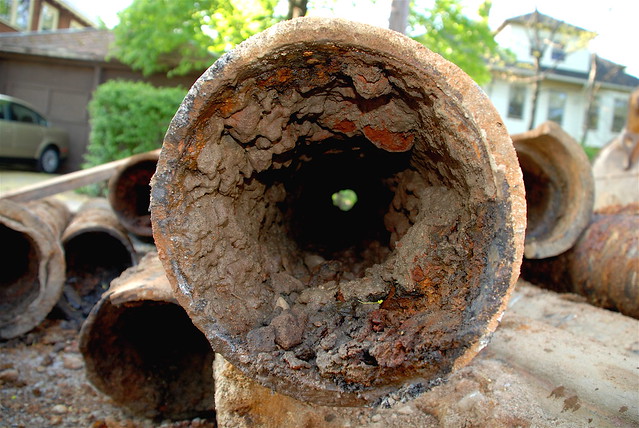 Infrastructurist | Water infrastructure may not be a sexy topic, but it’s becoming an important one. The American Society of Civil Engineers recently gave America’s drinking-water systems a grade of D-minus. Roughly 10 billion gallons of sewage seep into these crumbling pipes each year. The Obama administration has secured $6 billion for improvements, but the Environmental Protection Agency puts the true cost of fixing water infrastructure at roughly $335 billion. That figure seems staggering until we consider that parts of the country’s water system were built circa the Civil War.
Infrastructurist | Water infrastructure may not be a sexy topic, but it’s becoming an important one. The American Society of Civil Engineers recently gave America’s drinking-water systems a grade of D-minus. Roughly 10 billion gallons of sewage seep into these crumbling pipes each year. The Obama administration has secured $6 billion for improvements, but the Environmental Protection Agency puts the true cost of fixing water infrastructure at roughly $335 billion. That figure seems staggering until we consider that parts of the country’s water system were built circa the Civil War.It doesn’t take Abraham Lincoln to see the problem: people have never paid enough for their water, as this public service announcement points out, and they aren’t ready to start now. Attempts to raise utility rates for water systems in several cities across the country have been met with outrage. And because water pipes are out of sight, “no one really understands how bad things have become,” a member of the National Drinking Water Advisory Council told the New York Times in March:
“We’re relying on water systems built by our great-grandparents, and no one wants to pay for the decades we’ve spent ignoring them.”
A recent Newsweek cover story about the world’s water crisis (yes there’s still a Newsweek, for now) reports that some U.S. cities have been forced to privatize their water supplies. The shift enables officials to offload huge maintenance costs while promising jobs. But the colossal nature of water infrastructure lends itself to monopolization, and because water systems are underground they’re difficult for governments to monitor. In fact, Newsweek reports, some cities have grown so dismayed with privatized water that they’ve engaged in costly litigation to cancel the contracts.
The public may finally be ready to shoulder some of the burden. The results of a new survey, released earlier this week by ITT Corporation, suggest that people are willing to pay a little more—just a little—to keep the country’s water pipes from crumbling. (It should be noted that ITT deals in water infrastructure.) While 69 percent of survey respondents agreed that they take their access to clean water for granted, about two-thirds said they would be willing to pay $6.20 more per month to improve their water systems. If applied to all households across the country, such an increase comes to $5.4 billion, ITT notes.
It’s a modest start. Still, any solution requires public officials to confront the problem. So far that hasn’t happened. After all, writes columnist Bob Herbert, fixing America’s water system will take a “maturity and vision and effort and sacrifice” that many public officials seem to lack at the present time when it comes to infrastructure. Point in case, says Herbert:
We can’t even build a railroad tunnel beneath the Hudson River from New Jersey to New York.Well played, Bob.


0 comments:
Post a Comment